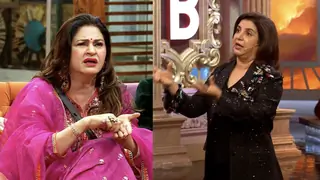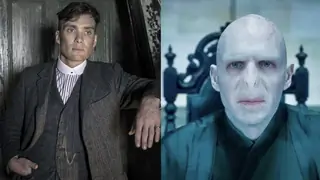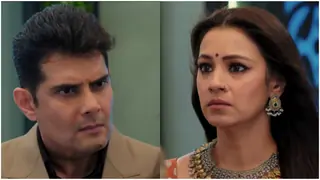| Why Karan Johar should stay away from Shah Rukh |
| By Lata Khubchandani |
| Friday, 21 September , 2007, 15:42 |
| A funny thing happened while I was watching Chak De. I kept seeing Karan Johar in my mind's eye. In fact, I saw him so often it was almost like he watched the film with me. You have to watch Chak De to realise how little Karan knows Shah Rukh Khan's strengths and weaknesses. It is thanks to such friendships that there has been predictability in Shah Rukh's acting. He has stagnated as an actor because that's where the vision of his friends starts and ends. It required an Ashutosh Gowarikar to envisage him in a Swades, a Sanjay Leela Bhansali to perceive him as Devdas and now a Shimit Amin to conceive a Chak De with him. [Please note I don't mention Paheli anywhere. It was an error of judgement on Shah Rukh's part and a huge coup for the middle class sensibilities of Amol Palekar.] The above directors expected SRK to move from facile love stories to universal roles -- and not only did he deliver, he also showed an amazingly attractive facet of himself that none knew existed. And in cinema, what can be better than such pleasant surprises? Karan has done nothing for Shah Rukh's career except cast him in teenybopper love stories. I include Kabhi Alvida Naa Kehna in the Karan Johar genre. To me, the movie reeked of a child playing 'I am grown up' games with no notion of what it was trying to say. Non-workable relationships exist and how! But they don't express themselves in the cheesy way KANK told it. A more superficial film on human relationships is yet to be made! In Chak De, Shimit Amin has used every cliche available. But, to his credit, he has still given us a wonderfully fresh pro-women film (without being anti-men) and he has left us gasping for more. When did one last ask for more in a Hindi film? Perhaps in a 60s Shammi Kapoor film, but never after that -- not even in Rang De Basanti. To Jaideep Sahni must go the credit for several cinematically superb moments and, unlike Johar, he refrained from dwelling on them or milking them nauseatingly. Remember the scene where Preeti Sabharwal wins the crucial goal and turns to the coach, hoping to be praised? SRK turns away, letting the moment pass. The trick was to keep the audience wanting more and not giving it. There were other moment -- Vidya, the captain, walks up to the coach and tries to strike up a personal conversation, but he leaves after patting her on the shoulder. Or when the coach approaches Bindiya to ask her to play a crucial match after making her sit on the bench for almost the entire season Note to Karan: such moments allow the audience to "feel" intelligent while watching a film. A bit of interpretation never harmed a creative work. Too much explanation is repulsive and retards the growth of both the actor and the audience. Chak De has brought a massive turnaround in the way people perceive Shah Rukh Khan. SRK's reactions and responses in the film did not rely on his stereotypical expressions. He even carried himself differently -- almost as if his personality grew up and matured, as if playing the coach allowed him to feel one with the character. As opposed to KANK where one could feel the lack of direction on the part of the director and the "I'm-out-of-my-depth" feeling on the part of SRK who played a "bad tempered husband". Why the comparison with Kabhi Alvida Naa Kehna you may ask? Because the media hype that surrounded it was tremendous, yet it failed to make the film work, while in Chak De a band of unknown girls and a macho coach have charmed the nation with their own brand of sincerity. Each of the 16 girls still drools over Shah Rukh's gentlemanly behaviour. Balbir from Chandigarh recounts how he kissed her hand and all the other girls wanted to kiss the same spot. Vidya says: "SRK has outdone himself. He's phenomenal in this role. SRK and Kabir Khan merged into one. Every time I see the film, I feel: My goodness, how much he has identified with this character." And that is the refrain that we hear repeatedly from everyone who watches Chak De. |




































57